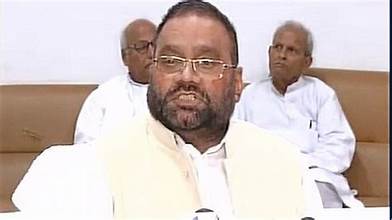In the complex tapestry of Indian politics, religion and governance often intertwine, sparking debates and controversies. One recent incident that captured national attention involved the inauguration of the Ram Temple in Ayodhya. This event, led by Prime Minister Narendra Modi on January 22, signified more than a religious ceremony; it represented a pivotal moment in Indian politics.
The Political Overtones of the Ram Temple Inauguration
The Ram Temple’s inauguration was not just a religious event but also a significant political statement. While devotees and supporters saw it as a fulfillment of a long-standing promise, opposition parties viewed it with skepticism. Swami Prasad Maurya, a leader from the Samajwadi Party, expressed concerns over the BJP’s intentions. He questioned the political motives behind the event, suggesting it was more of a party-specific agenda rather than a national celebration.
Opposition’s Perspective on BJP’s Agenda
Maurya’s comments reflect a broader concern among opposition parties regarding the BJP’s approach to religious matters. They argue that the BJP seems to prioritize religious issues over other pressing national concerns, a stance they believe could foster social divisiveness. The opposition accuses the BJP of using religion as a tool for political gain, an approach they contend is detrimental to the nation’s secular fabric.
The Controversy Surrounding PM Modi’s Fasting
Adding to the political drama, Veerappa Moily, a senior Congress leader, raised doubts about Prime Minister Modi’s recent fasting. Moily questioned the feasibility of Modi’s claimed 11-day water-only fast, suggesting it was physically improbable and potentially a political stunt. This criticism aligns with the opposition’s narrative that the BJP often engages in symbolic gestures that lack substance.
Balancing Religion and Politics in India
The intersection of religion and politics in India is a delicate matter. While religious sentiments are deeply ingrained in the Indian psyche, the political exploitation of these sentiments is a contentious issue. The opposition parties, particularly the Congress and the Samajwadi Party, emphasize the need to separate religion from politics, advocating for a governance model that prioritizes secularism and inclusivity.
The Way Forward
The ongoing debate between the BJP and opposition parties over the role of religion in politics underscores a fundamental challenge in Indian governance. As India continues to navigate its path as a diverse and secular nation, the balance between respecting religious sentiments and maintaining secular governance remains a critical aspect of its political discourse.
Disclaimer : इस न्यूज़ पोर्टल को बेहतर बनाने में सहायता करें और किसी खबर या अंश मे कोई गलती हो या सूचना / तथ्य में कोई कमी हो अथवा कोई कॉपीराइट आपत्ति हो तो वह jansandeshonline@gmail.com पर सूचित करें। साथ ही साथ पूरी जानकारी तथ्य के साथ दें। जिससे आलेख को सही किया जा सके या हटाया जा सके ।














